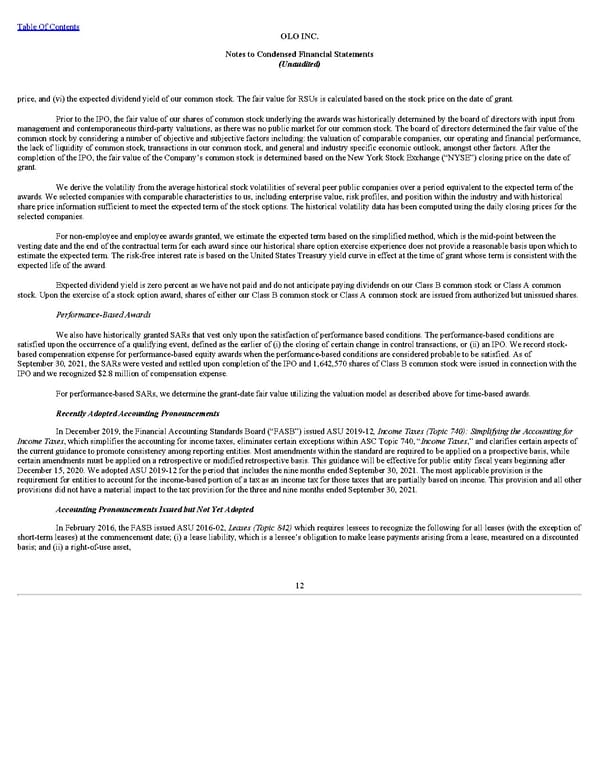Table Of Contents OLO INC. Notes to Condensed Financial Statements (Unaudited) price, and (vi) the expected dividend yield of our common stock. The fair value for RSUs is calculated based on the stock price on the date of grant. Prior to the IPO, the fair value of our shares of common stock underlying the awards was historically determined by the board of directors with input from management and contemporaneous third-party valuations, as there was no public market for our common stock. The board of directors determined the fair value of the common stock by considering a number of objective and subjective factors including: the valuation of comparable companies, our operating and financial performance, the lack of liquidity of common stock, transactions in our common stock, and general and industry specific economic outlook, amongst other factors. After the completion of the IPO, the fair value of the Company’s common stock is determined based on the New York Stock Exchange (“NYSE”) closing price on the date of grant. We derive the volatility from the average historical stock volatilities of several peer public companies over a period equivalent to the expected term of the awards. We selected companies with comparable characteristics to us, including enterprise value, risk profiles, and position within the industry and with historical share price information sufficient to meet the expected term of the stock options. The historical volatility data has been computed using the daily closing prices for the selected companies. For non-employee and employee awards granted, we estimate the expected term based on the simplified method, which is the mid-point between the vesting date and the end of the contractual term for each award since our historical share option exercise experience does not provide a reasonable basis upon which to estimate the expected term. The risk-free interest rate is based on the United States Treasury yield curve in effect at the time of grant whose term is consistent with the expected life of the award. Expected dividend yield is zero percent as we have not paid and do not anticipate paying dividends on our Class B common stock or Class A common stock. Upon the exercise of a stock option award, shares of either our Class B common stock or Class A common stock are issued from authorized but unissued shares. Performance-Based Awards We also have historically granted SARs that vest only upon the satisfaction of performance based conditions. The performance-based conditions are satisfied upon the occurrence of a qualifying event, defined as the earlier of (i) the closing of certain change in control transactions, or (ii) an IPO. We record stock- based compensation expense for performance-based equity awards when the performance-based conditions are considered probable to be satisfied. As of September 30, 2021, the SARs were vested and settled upon completion of the IPO and 1,642,570 shares of Class B common stock were issued in connection with the IPO and we recognized $2.8 million of compensation expense. For performance-based SARs, we determine the grant-date fair value utilizing the valuation model as described above for time-based awards. Recently Adopted Accounting Pronouncements In December 2019, the Financial Accounting Standards Board (“FASB”) issued ASU 2019-12 , Income Taxes (Topic 740): Simplifying the Accounting for Income Taxes , which simplifies the accounting for income taxes, eliminates certain exceptions within ASC Topic 740, “ Income Taxes ,” and clarifies certain aspects of the current guidance to promote consistency among reporting entities. Most amendments within the standard are required to be applied on a prospective basis, while certain amendments must be applied on a retrospective or modified retrospective basis. This guidance will be effective for public entity fiscal years beginning after December 15, 2020. We adopted ASU 2019-12 for the period that includes the nine months ended September 30, 2021. The most applicable provision is the requirement for entities to account for the income-based portion of a tax as an income tax for those taxes that are partially based on income. This provision and all other provisions did not have a material impact to the tax provision for the three and nine months ended September 30, 2021. Accounting Pronouncements Issued but Not Yet Adopted In February 2016, the FASB issued ASU 2016-02, Leases (Topic 842) which requires lessees to recognize the following for all leases (with the exception of short-term leases) at the commencement date; (i) a lease liability, which is a lessee’s obligation to make lease payments arising from a lease, measured on a discounted basis; and (ii) a right-of-use asset, 12
 Q3 2021 10Q Page 17 Page 19
Q3 2021 10Q Page 17 Page 19